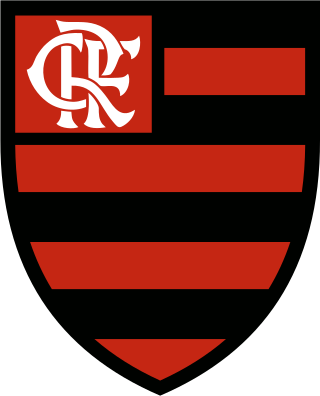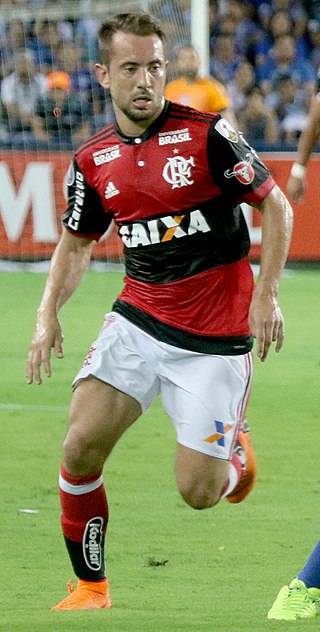
Clube de Regatas do Flamengo, more commonly referred to as simply Flamengo, is a Brazilian multi sports club based in Rio de Janeiro, in the neighborhood of Gávea, best known for their professional football team. They are one of two clubs to have never been relegated from the top division, along with São Paulo. Flamengo is the most popular team in Brazil with more than 46.9 million fans, equivalent to 21.9% of the population that supports a team in Brazil.

The Campeonato Carioca, officially known as Campeonato Estadual do Rio de Janeiro, also commonly known as the Cariocão, is the state football league of Rio de Janeiro, Brazil. It is under the authority of the FERJ or FFERJ. It is an annual tournament, started in 1906.

Thomaz Soares da Silva, also known as Zizinho, was a Brazilian footballer who played as an attacking midfielder for the Brazil national football team. He came to international prominence at the 1950 World Cup, where he scored two goals. He was lauded as a complete player, with an array of offensive skills such as his dribbling, passing, and shooting ability with both feet, as well as his accuracy from dead ball situations and extraordinary vision. He was Pelé's idol, and is often considered one of the best Brazilian men's footballers of the pre-Pelé era.

Marcelo Pereira Surcin, known as Marcelinho Carioca, is a former Brazilian professional footballer who played as an attacking midfielder. He was known as Pé de Anjo for his free kick accuracy, having scored 80 goals in this manner out of a total tally of 505.

Abel Carlos da Silva Braga, known as Abel Braga, is a Brazilian former football coach and player.

Joel Natalino Santana is a Brazilian football coach and former player. He was recently in charge of Vasco da Gama in 2014.
Luís Carlos Nunes da Silva, nicknamed Carlinhos, played for Flamengo between 1958 and 1969. Because of his elegant football and his thin voice, he was known as "The Violin". In Flamengo, he won the 1961 Torneio Rio-São Paulo and twice the Rio State Championship.

Arílson de Paula Nunes, better known as Paulo Nunes, is a Brazilian football pundit and retired footballer who played as a forward.
Jorge Luís Andrade da Silva, known as Andrade, is a Brazilian professional football coach and former player who played as a defensive midfielder. He spent the majority of his career for Flamengo in the 1970s and '80s, where he won several trophies, including four national championships and the Copa Libertadores.

Crizam César de Oliveira Filho, better known as Zinho, is a Brazilian football pundit and retired footballer.
Alfredo Moreira Júnior, usually known as Zezé Moreira, was a Brazilian football player and manager who coached Brazil at the 1954 FIFA World Cup. He has the most coaching appearances in Fluminense's history, with 467 managed matches for the Tricolor. His brothers also had a singular taste for football: Aymoré Moreira, winner of the 1962 FIFA World Cup and Ayrton Moreira, both of them successful coaches in the Brazilian football. In 1976, as Cruzeiro's manager, he won the Copa Libertadores.

Éverton Augusto de Barros Ribeiro is a Brazilian professional footballer who plays as an attacking midfielder or winger for Campeonato Brasileiro Série A club Bahia.
Wilson Roberto Gottardo, commonly known as just Wilson Gottardo, is a Brazilian former association footballer who played as a defender and the current coach of the Villa Nova-MG. He played in several Brazilian Série A clubs.
Sidney Pullen was an English-born Brazilian football midfielder, who played for Flamengo, a club based in Rio de Janeiro.

Rodrigo Caio Coquette Russo, known as Rodrigo Caio, is a Brazilian professional footballer who plays as a central defender for Campeonato Brasileiro Série A club Grêmio.

Gabriel Barbosa Almeida, commonly known as Gabigol or Gabi, is a Brazilian professional footballer who plays as a forward.

Giorgian Daniel de Arrascaeta Benedetti is a Uruguayan professional footballer who plays as an attacking midfielder or left winger for Campeonato Brasileiro Série A club Flamengo and the Uruguay national team.

Gerson Santos da Silva, simply known as Gerson, is a Brazilian professional footballer who plays as a midfielder for Campeonato Brasileiro Série A club Flamengo and the Brazil national team.

Pedro Guilherme Abreu dos Santos, better known as Pedro, is a Brazilian professional footballer who plays as a striker for Campeonato Brasileiro Série A club Flamengo and the Brazil national team.
Alberto Borgerth, was a Brazilian rower, footballer, medic, and chairman of Flamengo and FFERJ.














